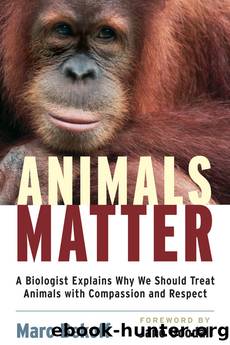Animals Matter by Jane Goodall

Author:Jane Goodall
Language: eng
Format: epub
Publisher: Shambhala Publications
Education, conservation, biodiversity, and endangered species
Two common reasons given to justify the existence of zoos include education and conservation. Some people believe that zoos are good because they educate people about animals in general and also about animal species that they would otherwise never get to see. However, Michael Kreger, at the Animal Welfare Information Center, found that the average visitor spends only from about thirty seconds to two minutes at a typical exhibit and only reads some of the informational signs about the animals. A number of surveys have shown that the predominant reason people go to the zoo is to be entertained. In one study at Edinburgh Zoo in Scotland, only 4% of zoo visitors went there to be educated, and no one specifically stated they went to support conservation. There is very little evidence that much educational information is learned and retained that will help the animals in the future.4
Some people defend the existence of zoos because they might serve to keep individual animals of rare, threatened, or endangered species alive when the habitat of these individuals has been destroyed. However, it has been estimated that about 50%–70% of orphaned gorilla infants who are taken into captivity will not survive. The figures are similar for orphaned gorilla infants and juveniles who are released from captivity back into the wild. Living in captivity does not prepare individuals for the conditions they will face when they are on their own in the wild.
Sometimes zoos are defended as a place to care for individual animals with the intention that they (or perhaps their offspring) will be released into the wild sometime in the future. The purpose here is to help preserve or increase populations of species that are endangered in the wild. Thus, some people believe that zoos are valuable because they will help maintain biodiversity, by preventing some species from going extinct. They argue that without zoos, biodiversity will decrease as species die out. Thus—according to this argument—zoos potentially can be important in conservation efforts by keeping animals in safe places and then releasing them into the wild.
The problem with this idea arises when the animals’ habitat is not preserved for them: if people use the land for human purposes while the animals are held in captivity, there will be no suitable place for them to be released into. This happens quite often. Indeed, most conservation biologists agree that habitat loss is the major cause for losses of biodiversity. There are too many people and too little land for animals to thrive and survive. The situation is not getting better. Remember that in Kenya it is estimated that wild lands are disappearing at a rate of 2% a year. Jane Goodall has repeatedly told audiences around the world that more habitat is needed in order to protect the endangered great apes. The same can be said for a number of other species, including wolves. The main reason why there is so little suitable habitat is because there are too many people.
Download
This site does not store any files on its server. We only index and link to content provided by other sites. Please contact the content providers to delete copyright contents if any and email us, we'll remove relevant links or contents immediately.
How Do You Live? by Genzaburo Yoshino(795)
150 Survival Secrets by Jones James C(679)
Grow Houseplants by DK(574)
The Kitchen Pantry Scientist by Liz Lee Heinecke(571)
Teaching Anatomy by Unknown(558)
Ultimate Paper Airplanes for Kids by Andrew Dewar(549)
Getting Started with Adafruit FLORA by Becky Stern(536)
Coding for Kids: The Complete Guide Python Programming for kids, Learn to Code with Games by Alice Guillen(531)
Math Maker Lab by Dorling Kindersley(518)
How to be a Math Wizard (Careers for Kids) by DK(517)
The Wizard In My Shed by Simon Farnaby(513)
Iggy Peck and the Mysterious Mansion by Andrea Beaty(505)
Classification in the Wild by unknow(501)
Facing the Sun by Janice Lynn Mather(491)
Gardening for Kids: Learn, Grow, and Get Messy with Fun STEAM Projects by Brandy Stone(469)
The Trouble With Babies by Claudia Mills(466)
The Planet Jupiter by Various(437)
Plants on the Move by Émilie Vast(434)
Social Life in the Insect World by Jean-Henri Fabre(432)
